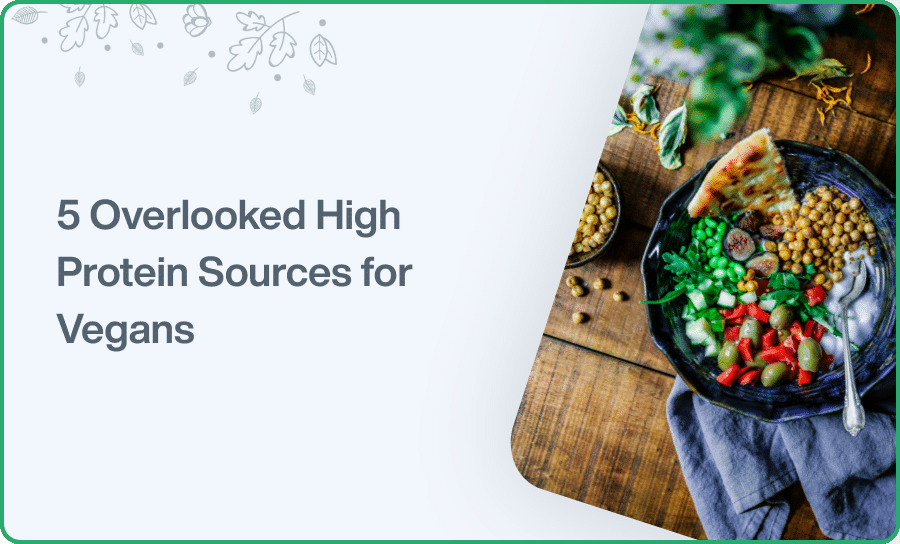Every vegan knows that tofu, beans, and oats are the heart and soul of plant-based eating. From sesame garlic tofu and gourmet bean burgers to an endless variety of oat bowls, these staples run deep within the vegan community.
But what are some healthy lesser known sources of high protein that plant-based eaters can incorporate into their next meal?
Here are 5 commonly overlooked sources of protein that vegans and vegetarians should be using in the kitchen, right now!
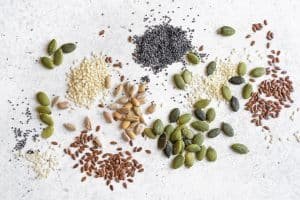
Image source: scientificamerican.com
Seeds
Nuts and seeds are often grouped together as a high source of protein for many plant-based eaters. But more often than not, the emphasis is placed on the nuts and the seeds go forgotten.
Unlike nuts, seeds come from vegetables (pumpkin seeds), flowers (chia seeds), and crops (hempseed). They are primarily comprised of healthy fats, fibre and protein. Depending on which seeds you choose, there is a multitude of health benefits (alongside their protein levels) that make seeds so beneficial.
One of the highest sources of seed-based protein in hempseed. Hempseed derives from the plant, Cannabis Sativa, which is most well known for being in the same family as other “alternative” plants. But while hempseed may come from the same family as its drug-producing counterpart, it only contains trace amounts of THC and is completely safe for consumption.
Hempseed contains 5g of protein per tbsp and is also a strong source of magnesium, calcium, iron, and zinc.
For reference, 1 tbsp of chicken contains 3g of protein.
It also contains the two fatty acids, omega-3 and omega-6, at the ideal ratio for human absorbment.
The next highest source of seed protein is pumpkin seeds. Pumpkin seeds contain 4g of protein per tbsp, along with magnesium, zinc and valuable antioxidants that protect our cells against free radicals.
Other high protein seeds include ground linseed (3g/tbsp), chia seeds (2g/tbsp), and buckwheat (1.5g/tbsp).
While seeds aren’t necessarily food you should be eating by the spoonful, they can be incorporated into your diet in various ways. Sprinkling them on top of salads or smoothie bowls is a great way to build up protein intake, or even using them in homemade dressings and recipes. This is still a great way to add high protein foods vegan diets need.
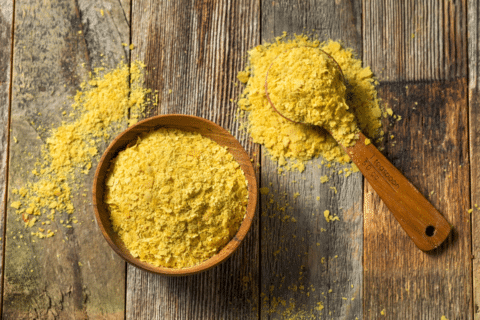
Image source: womenshealthmag.com
Nutritional Yeast
If you haven’t used nutritional yeast in a vegan cheese recipe yet, you are seriously missing out.
Nutritional yeast is a strain of Saccharomyces cerevisiae yeast that is typically sold as a yellow flakey condiment with serious cheesy vibes. It contains 4.5g of protein per tbsp and fortified versions are also a strong source of magnesium, zinc, and B vitamins.
Fortified nutritional yeast refers to the manufacturing process, as a method that boosts vitamin and nutritional content. Most nutritional yeasts are fortified as a way to increase vitamin B levels.
The most common way to incorporate nutritional yeast into your diet is by sprinkling it on top of savoury foods, like pasta and potatoes, or including it in a sauce to add a cheesy flavour.
Our favourite way to use nutritional yeast is in vegan mac and cheese. Blended with some cashews, nut milk, and other seasonings, nutritional yeast is a staple when it comes to adding flavour to creamy sauces! Nooch is one of many great high protein foods vegan diets benefit from/
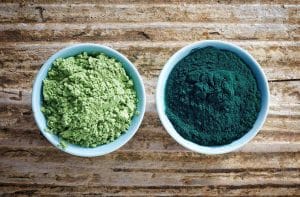
Image source: wellandgood.com
Spirulina
Spirulina is a photosynthesizing organism that is commonly regarded as one of nature’s superfoods. It is a type of cyanobacteria and is also known as blue-green algae.
What? You want me to eat algae?
Yes.
Not only does spirulina contain 4g of protein per tbsp, but also it’s packed full of nutrients and antioxidants that are essential for brain and body development. Its dark pigment comes from phycocyanin, a naturally occurring antioxidant and anti-inflammatory, making it a natural immunity booster.
Spirulina is one of the most nutrient-dense foods on earth.
Most people are put off by its grassy taste when eaten plain, but with a little creativity, spirulina can be incorporated into a variety of foods and recipes that you would have never thought possible.
Not only is spirulina a health-boosting powerhouse, but also it is a prized skin-food for its detoxifying elements.
Try adding it to smoothies, protein balls, and even fruity drinks for an easy way to increase protein and maybe just improve your complexion along the way!
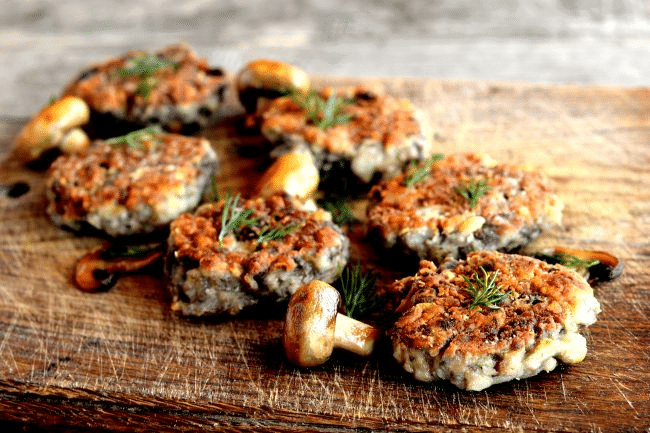
Image source: vitacost.com
Mycoprotein
Mycoprotein is a lesser-known plant-based protein source, but with 4g per tbsp, it tops the list as a high-density source of vegan-approved protein.
Derived from Fusarium Venenatum, a naturally occurring strand of fungus, mycoprotein is most often found in meat substitutes. Similar to mushrooms, mycoprotein is a potential allergen for some, so before consuming you may want to double-check your tolerance.
Because mycoprotein is not sold as a raw ingredient or powder, the only way to get it is through brands such as Quorn.
Quorn incorporates mycoprotein into their meat replacement products as a plant-based source of protein and fibre. Some of Quorn’s products may not be vegan though, so make sure you double-check the ingredient list before consuming.
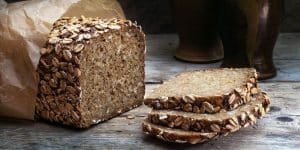
Image source: goodhousekeeping.com
Ezekiel bread
Ezekiel bread, and other loaves of bread grown from sprouted grains, are probably the easiest overlooked protein source to start integrating into your diet.
With 4g of protein per slice, Ezekiel bread can easily replace any type of bread you are currently consuming. It is made from sprouted whole grains and legumes, such as millet, barley, soybeans, and lentils.
Sprouted grains are advantageous due to their increased nutrient value and amino acid count. They are formed from whole-grain seeds that have already begun to sprout and are first soaked, then nurtured within a temperature-controlled environment.
The sprouted grains that makeup Ezekiel bread are more nutritious than regular whole grains because catching grains during their germinating process minimizes their starch content, thus increasing their percentage of nutrients. Even though they contain the same nutritional content as regular whole grains, sprouted grains have a higher absorption in the body.
Placing the seeds in a moist environment to sprout and germinate before use prompts bacterial growth. Therefore, raw sprouted grains aren’t recommended for direct consumption. But using them for baked or in other baked recipes, subjects the bacteria to high heat, killing it off.
An important note is that sprouted grain loaves of bread and goods should be kept in the refrigerator after buying or baking due to their limited shelf life.
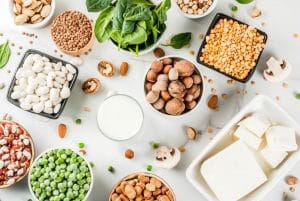
Image source: hipandhealthy.com
Other Sources of Vegan Protein
While these 5 foods are some of the most forgotten sources of plant-based protein, the list doesn’t end here.
Some other common sources of plant protein include
- Beans and lentils
- Tofu
- Soy (milk, edamame, yoghurt, etc.)
- Quinoa, amaranth, spelt, and teff
- Oats
- Nuts
- Green peas (think pea protein)
- Seitan
Most of these sources may have a lower protein content per tbsp, but they are typically less calorie dense and are enjoyed in heaping servings, rather than as a topping or ingredient.
Many plant-based eaters also rely on protein powders and supplements to boost their protein intake, but while this may be the more convenient option, many powders are filled with stabilizers and fillers that aren’t always the healthiest.
Not to mention, they typically contain explosive amounts of sugar.
If you are trying to get the most out of your health, sticking to natural foods and ingredients that come directly from the earth is recommended. And remember, just because a protein bar has “vegan” plastered across its front, it doesn’t mean that it’s a healthy option.
How to Get Your Daily Dose
After learning about a variety of healthy vegan protein options, you may be wondering
How do I even incorporate these into my everyday meals?
A quick Google search for “high-protein vegan recipes” is a sure way to get creative, but you can also check out our blog at Plant Sumo for some dinner inspiration and fun vegan tips!
FAQs
1. What can a person who is a vegan eat as a source of protein?
Vegan protein options include nuts, seeds, grains, and legumes. Soymilk and tofu also provide protein and peanut butter.
2. What vegan food is the highest in protein?
Here are some high protein sources for vegans:
- Tofu
- Peanuts
- Almonds
- Lentils
- Chickpeas

